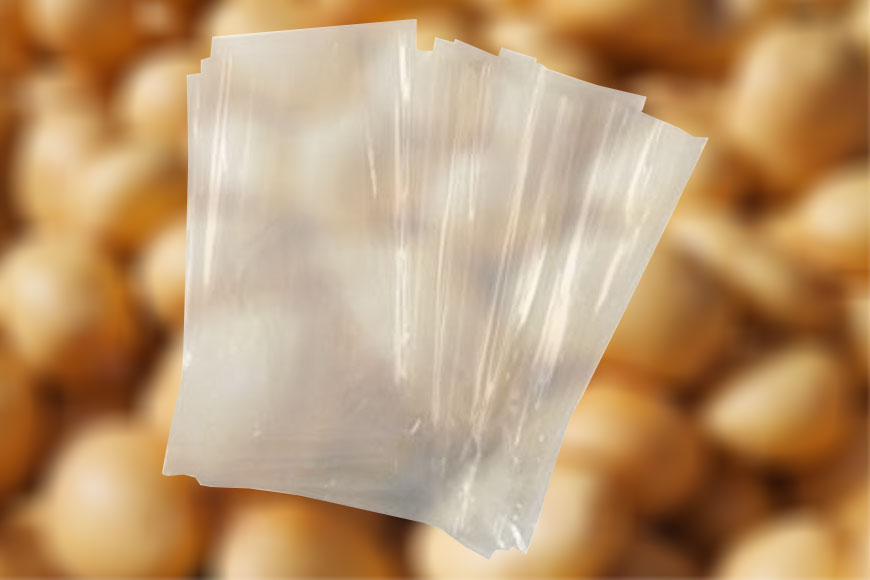Bengali scientist invents unique biodegradable plastic that can even be eaten!

The year was 2016. Young Bengali scientist Sudipto Basu was posted at Food Corporation of India (FCI) office in Odisha. There he noticed loads of empty rejected plastic bags were being disposed off from the FCI warehouse callously. But we are all aware how plastic bags can damage the environment. For urban solid waste, plastic bags have become major items in the litter system. This has resulted in many detrimental environmental effects including animal choking, pollution, blockage of channels, rivers and streams, and landscape disfigurement. The major impact of plastic bags on the environment is that it takes many years to decompose. In addition, toxic substances are released into the soil when plastic bags perish under sunlight and, if plastic bags are burned, they release a toxic substance into the air causing ambient air pollution. This made him thinking, and he decided to work on developing alternatives to plastic bags.
Basu has been working on solar energy for the past 17 years but he, along with his team of researchers including Dr Shourya Das, Shubhobrata Guha Burman, Sanjay Mondal, Dona Mondal, Dev Mitra and Pinaki Guha, decided to step out of their comfort zone and explore for a biodegradable alternative to plastic and they triumphed!
If the new biodegradable bag made of potato starch is left on land, it will take only 180 days to completely decompose and turn into soil and if it is boiled in water, it will disintegrate and mingle with water instantly. The most interesting aspect of the new bag is that it is not only soluble but is edible as well! Basu has been working tirelessly on this project for the past three years. He has been wheeling from Institute of Chemical Engineering at Mumbai to Indian Institute of Technology (IIT) Guwahati to study and familiarize himself with the technical aspects of mass production and other nitty-gritty of the feasibility of the project. After equipping himself on the technological aspects, Basu used his innovative skills to fructify his dream plan.
Research on biodegradable plastic, also known as bio-based plastic has been going on globally for more than two decades now. It can either be made by extracting sugar from plants like corn and sugarcane to convert into polylactic acids (PLAs), or it can be made from polyhydroxyalkanoates (PHAs) engineered from microorganisms. India has been manufacturing bio-based plastic for more than a decade but it is for the first time that it has been produced in West Bengal. The bio-based plastic invented by Basu and his team is characteristically different from other biodegradable plastic. Usually, corn starch is widely used for manufacturing these bags. Sugarcane, sago (saboo dana) and soyabeans are also used extensively but Basu and his team have used potato and edible oil for the first time to produce biodegradable plastic bags. But what is so special about the plastic that Basu and his team have invented?
Basu explained the bio-plastic that’s manufactured in the country and is available in the market costs around Rs 900 a kilogram whereas plastics made of petro carbons are available for Rs 150 a kilo. Naturally, consumers prefer to use the cheaper stuff and are reluctant to shell out extra money for bio plastics. Basu claims they have managed to cut down the price of their plastic by a two-third. They manufactured the prototype for Rs 600 and once manufacturing starts on a large commercial scale, prices will automatically drop.
At present, this special plastic is being manufactured at a small manufacturing unit in South India. The project has been acknowledged by the Government. The scientists are distributing these plastic bags to shopkeepers free of cost to find out the utility and durability of the product. If their innovation is received well by the people and the response is positive, they have plans to set up biodegradable plastic manufacturing factories in West Bengal as well. These young scientists are committed to protecting the environment. Our environment is what houses and helps our ecosystem grow and thrive. Without protecting and taking care of our environment we're putting so many lives at danger including animals, plants and crops, and even our own. All of the ecosystems that make up our environment are deeply connected. A healthy environment is also conducive to economic development believes Basu and there is no way to deny this truth.










